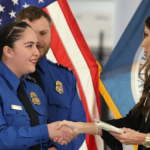There are a series of routine questions that job seekers know to expect at a job interview.
Most people can perfectly recite a time they had to handle stress on the job, or blag their greatest strengths without coming across as overly cocky.
But one interview question shocked a candidate so much that she shared it on social media—and the internet is equally astonished (and often, outraged) by it.
“How do you feel life has worked out for you so far?” Salem Pierce was asked as part of her application for a visual design lead position at an unnamed company online.
Pierce described the demand as a “new level of job application hell” and many others online agreed.
The notion that hiring managers would ask job candidates to go through the efforts of preparing, filming, and uploading a video—and ask such a personal question—didn’t go down well with most people.
A number of Twitter users were also concerned that the question is at best intrusive, and at worst, discriminatory.
Idk where in the interview process this is from, but do not like this. I could see so many ways this is an innocuous seeming way to weed out people from a protected class under the guise of “fit” or “attitude” or “charisma”
Despite the general consensus that the question is inappropriate, a small number of people welcomed the chance to open up about their life so far and explain any gaps in their CV.
Job hunters can expect to be asked some personal questions, but timing and wording are key to keeping things professional, recruiters tell Fortune.
“I understand why the question was asked as I think overcoming obstacles really shapes a person and can make you stronger, smarter, and really grow,” Victoria Naughton, a senior associate at u&u Recruitment Partners, says.
But she warns employers that such information isn’t appropriate to ask at an early stage of an interview before even having met the candidate in person.
“Job applications need to be based on skills. Anything other than that can leave space for discrimination and bias. Which this is an example of,” agrees Zahra Amiry, Omnicom Media Group’s talent attraction associate director.
Personal questions can indeed be asked later on in an interview setting, but she cautions that they must be “professional and noninvasive” to avoid crossing the line.
Amiry suggests leaning on classic questions like “How would you overcome a challenge?” or “Tell me about something you have achieved that you’re proud of?” because they enable candidates to “be candid and pull from personal experience—if they would like to.”
Whether or not a hiring manager intends to be intrusive when asking a personal question, these things can happen. And the line between what’s offensive and acceptable at an interview is completely subjective.
So instead of getting bothered by a question, first breathe.
“My biggest tip in any interview is always to take a few seconds before any question, take your time to formulate an answer,” Amiry says.
That way you can think, if the question does make you uncomfortable, how can you answer it in a way that brings the conversation back to your career?
But if the question is beyond outrageous, then don’t forget that it’s not only you in the hot seat: As much as an employer is judging you, you’re equally considering whether the role and the company are right for you.
“An interview is a window into a company culture,” Amiry adds. “So remember if the interview doesn’t reflect well, there may well be another role elsewhere that is a better fit for you.”









